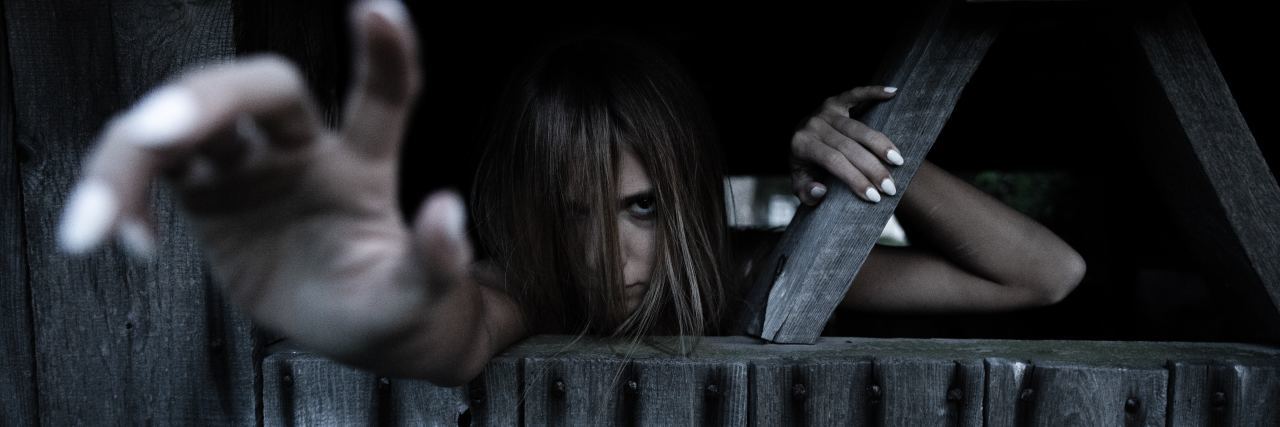I’ve been struck lately by the usefulness of certain zombie-themed entertainment as a metaphor for chronic illness. In the more compassion-driven zombie movies, TV shows and games I’ve seen, the experience of the person who is becoming a zombie tends to be included in and sometimes totally central to the narrative.
In the video game “Resident Evil 7,” I played as the main character, Ethan, navigating a threatening environment while both attempting to rescue and avoid being killed by my wife Mia, who is becoming a zombie. The relationship is established from the beginning, emotionally investing the player immediately. The goal is always to help your wife and, if possible, to save her from this affliction. It’s not to kill her or leave her to die.
As someone with chronic illness, I’ve had to work to believe I am worthy of that kind of automatic, unconditional love. I know that, in many marriage vows, each person promises to love the other “in sickness and in health,” but wow, the experience of having that specific clause become active is a whole other thing than the romantic notion of pledging it.
I still feel like a burden sometimes since I don’t function as well as I used to (especially since I live in a capitalist hellscape wherein we all must earn our survival, even if totally unable) but perhaps I’d do well to remember that, despite the likelihood Ethan had a better chance of survival if he left Mia for dead, it never even felt like an option to him, or to me I should say, as I played. It wouldn’t have felt like “winning” the game without her. I should give my spouse as much credit, especially as he’s been unfalteringly supportive. I recognize how fortunate I am to have someone supporting me in the ways he does, and not everyone in my position has that.
Rewatching season one of “Santa Clarita Diet,” I was reminded of the tenderness and compassion with which Shelia’s (Drew Barrymore) family treats her. In episode four, Sheila’s husband and daughter acknowledge together how alarmed they are by Sheila’s sudden personality and behavioral changes. They mention how she’s gone from overly self-controlled to practically driven by her id. They love her unconditionally, though, and that is clear.
I don’t believe the changes I’ve undergone since becoming chronically ill are necessarily parallel to Sheila’s changes — I’m not hungering for human flesh — but the changes that person goes through while managing chronic illness can be scary, both to the sick person and to those who love us. Some things are threatening, some mysterious. There are unexpected joys and unplanned pains. But the ones who love us are here for us, despite the fear it provokes in them.
I don’t hunger for human flesh, but I do hunger for my old abilities. I hunger for the moments when I don’t feel like I am rotting off my own bones, which come and go. I’ve noticed that since I’ve actively been working on caring for myself and cutting down stress, I do feel more alive. I’ve been forced to confront and change my image of myself and to accept how my goals, and to an extent, my desires, have shifted.
Prioritizing my own emotions and physical well-being does not come naturally to me. I tend to defer my own needs to please others. I attempted to build a career on that tendency for a time, but I don’t have the energy for that anymore. I have to take care of myself so I can remember, every day, how very worth it living is. I have to take care of myself so I can take care of the people and cats I love. I have to take care of myself because if I don’t, I start to feel inconsequential. Treating myself as a creature in need of love and tending soothes my soul infinitely more than treating myself as a machine ever has. Losing some of my health has restored some of my humanity and has shone a light on the love I have all around me.
Sheila underwent a terrifying transformation and came through it still loved, and more herself than ever. Mia’s life and presence was reason enough to stick around, reason enough to keep on loving her, despite how frightening her affliction sometimes was.
Honestly? Same.
Photo by Alex Iby on Unsplash

